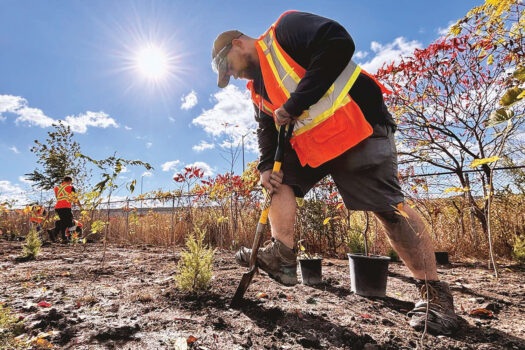The issue of accepting cash payments in return for discount prices or avoiding tax is big for many members of Landscape Ontario.
Current estimates suggest that the cash payment or underground economy may account for 10 per cent of Canada’s GDP.
A recent question from LO executive director Tony DiGiovanni on Landscape Ontario’s LinkedIn group, asked, “Many members report that customers are pressuring them to accept cash in order to save on HST. If they don’t accept, they are losing valuable jobs to those that do. On the other hand, I have spoken to consumers who have informed us that their contractor offered to lower the price if they paid cash. What can be done to alleviate the pressure? What are the pitfalls to the consumer or company? What should Landscape Ontario do? Should we produce a flyer targeted to the consumer, informing them about the risks of cash payments? Should we work with government to ensure a level playing field?”
As a result of the online discussion, LO sent a letter to Ontario finance minister Dwight Duncan, requesting a home renovation tax credit and a public relations campaign to educate the public on the harmful consequences of cash deals.
Terry Childs, of Natural Care Lawn and Garden in Gananoque, wrote, “We should be pointing out simple things, such as the legal ramifications of tax evasion and the danger of using people who may not have WSIB, or liability insurance. Perhaps we could work with insurance companies to inform customers what the result may be if a worker or someone hurts themselves on a non-WSIB job site.”
Tim Kearney CLP, LO’s first vice-president, of Garden Creations of Ottawa, stated, “The black market is a sign of the times. Both contractors and customers search for ways to be creative and achieve their goals. As contractors, we can only educate and hope the system we live in is able to weed out the problems, so that ethical businesses can continue to operate.”
He concluded his input with, “I would truly love to think that this virus is spread by those who don’t know. I need to be assured this is so. When sales are challenged, people do some silly things. When economies are tight, people do some silly things. Two wrongs don’t make a right.”
Sarah Johnston of Greenlife in Manotick, past president of the Ottawa Chapter, wrote, “It seems to be happening to our business more this year than in previous — this very day in fact! We tell the client all the disadvantages and the ethical business bit. We also tell them that they are welcome to pay by cash, but the price remains the same (tax included) and an invoice will be produced and go through the books. However, we do offer a small discount (two per cent) for pre-payment on a job, which they seem to like and helps our cash flow. A pamphlet from LO would be a great bonus and educator for the client.”
Paul Doornbos CLP, CLT, of Thornbusch Landscaping in Lansdowne, opened with promoting the renovation tax credit. “Best thing LO should do is work with CNLA to lobby the government to reinstate the tax credit. It addresses the above issue and is a great stimulator.
“Might we also include this as an opportunity to work with agencies such as MOL, WSIB, CFIB, BBB, local chambers of commerce, various levels of government, etc., along with other associations to create public/consumer awareness? Working with other groups that share the same issues and challenges creates synergies, relationships, and a unified voice that is louder collectively.”
Wolfegang Bonham of Peace, Love and Landscaping in Burlington, touched on the issues of professionalism, honesty and the tax credit. “It is certainly tempting for a homeowner to suggest under-the-table cash payments. I simply inform them that I have a paper trail for my materials, my staff’s wages, WSIB, etc., and that if they want a warranty, or a tax write-off, then the HST is part of that.”
Bonham said he thinks the problem goes deeper than just the HST. “Any contractor taking cash under the table is probably also not paying WSIB, carrying commercial liability insurance, etc., let alone knowing anything about overhead recovery. As a result, their pricing is going to be MUCH cheaper regardless of the HST.
“We need to educate the public in the value of having a certified, professional installer conducting the work on their property. We also need to strike a bit of fear into the public about the potential pitfalls of cash business in terms of risks, liability, warranty, and ultimately quality. LO has been working toward that end, but there is still a long journey ahead.
“I completely agree that petitioning the government to bring back the Home Renovation Tax Credit (with more focus on landscaping than the previous incarnation) would go miles toward enticing clients to swallow the HST.”
CNLA was also encouraged to contact the federal minister of finance. “It is a testament to the power of the LinkedIn network that I received a call from Robert Wood, executive director of the Pool and Hot Tub Council, asking to participate in this government relations activity,” says DiGiovanni. The letter to the minister was signed by both executive directors, who wrote, “We request a meeting with your ministry to discuss this issue in more detail. We welcome working with the government to eliminate the underground economy and promote economic and social development.”








